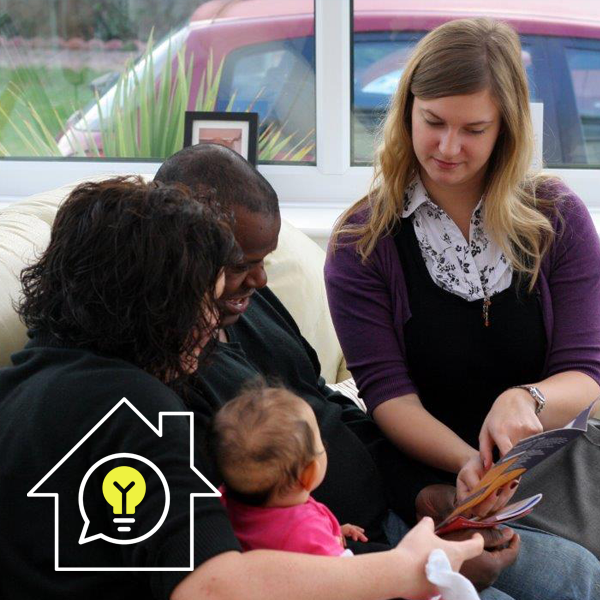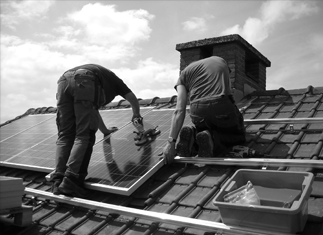
Introduction to domestic renewable low carbon technologies (Level 2 Award – CQ11641/001)
This course provides an introduction to renewable technologies including: biomass, heat pumps, solar thermal hot water and solar PV.
The UK government set out a target, enshrined in the Climate Change Act (2008), to achieve net zero greenhouse gas emissions across the whole of the UK by 2050.
Decarbonising homes is central to achieving that target and there is an urgent need to address the carbon emissions produced in heating and powering domestic properties. While the electricity powering lighting and appliances is decarbonising fast, the majority of homes still rely on burning fossil fuels for heating, hot water and cooking.
This course will provide an introduction to the role domestic scale renewable technologies can play in reducing carbon emissions. It will provide a non-technical explanation of how the technologies work, the factors to consider when installing these technologies, costings, potential carbon savings and their advantages and drawbacks.
Course audience
Anyone who requires an introduction to decarbonising energy use in the home through the installation of the main renewable technologies.
Pre-requisite
The course requires no prior knowledge of biomass, heat pumps (air and ground source), solar thermal hot water and solar photovoltaics.
As this is a level 2 qualification, learners will require basic literacy and numeracy skills.
Course aim
The overall aim of the course is to explain the role the key domestic renewable technologies – biomass heaters and boilers, heat pumps, solar thermal hot water and solar photovoltaics – can play in decarbonising energy use in the home.
Course objectives
Explain:
- decarbonisation
- the main renewable heat technologies – biomass, heat pumps and solar thermal hot water
- renewable electricity – solar photovoltaics
- the factors to consider before installing domestic renewable technologies
- advantages and drawbacks of the main technologies
Course content
The course will be broken down into four sections as follows:
Session 1 – Background and Biomass
- What is decarbonisation?
- Energy use in the home and emissions
- How to decarbonise domestic energy use
- Financial support – ECO, Boiler Upgrade Scheme, Local Authority Deliver (England only), Home Upgrade Scheme (England only) and Nest (Wales only)
- Role of biomass:
- biomass fuels
- technologies – stoves and pellet boilers
- emissions and regulations
- storage and delivery
- advantages and drawbacks of biomass
- property/ householder checklist – what the householder should be considering when installing this technology in terms of property characteristics and their circumstances
Session 2 – Heat Pumps
- How they work
- Types of heat pump
- Focus on air source and ground source
- Heat distribution systems
- Cost and maintenance
- Advantages and drawbacks
- Property/ householder checklist
Session 3 – Solar Thermal Hot Water
- How it works
- Solar collectors
- Ideal setting
- Output
- Cost and maintenance
- Advantages and drawbacks
- Property/ householder checklist
Session 4 – Solar PV
- Electricity use in the home
- How solar PV works
- Output
- Ideal setting
- Grid-tied battery storage
- Cost and maintenance
- Advantages and drawbacks
- Property/ householder check
Please note that the content of this course focuses on England and Wales. If you are based in Northern Ireland or Scotland, please contact NEA to discuss the main differences in content.
Delivery method
Webinar and open book assessment.
How will the WEBINAR work?
Webinars are delivered live by our expert tutors.
We keep group sizes small to ensure a good level of interaction and support for learners.
We generally use Zoom (video conferencing facilities). To join the webinar, learners will require a suitable electronic device with sound and internet access and preferably a video camera and microphone.
Following the webinar, learners will also receive a handout booklet covering the course topics.
How will the ASSESSMENT work?
The assessment consists of one open book exam which will take around three hours to complete.
There are no set assessment dates to attend, upon completion of the course, learners will be sent a link to access the exam online so they can complete and submit it within two weeks. The open book format also means that learners are able to refer to their course handouts to complete the exam.
This qualification has been accredited as a Customised Qualification and we have benchmarked the qualification’s learning outcomes and assessment criteria at Level 2 to allow you to demonstrate the difficulty and depth of study.
NCFE is an awarding organisation recognised by the qualification regulators for England (Ofqual), Wales (Qualifications Wales) and Northern Ireland (CCEA Regulation). This is an unregulated qualification and is not a nationally recognised qualification
Duration
Two half-day webinars followed by an open book assessment, there are no set timescales for the assessment but it is expected to take around three hours.
Fees
*FUNDED PLACES are available to non-commercial organisations based in England and Wales (such as local authorities, housing associations, advice agencies etc). Learners must also be frontline staff or volunteers who encounter and provide advice to those in or at risk of fuel poverty. This applies to webinar delivery only.
For those not eligible for a funded place, fees are as follows:
Open access webinar fees (per person)
| NEA Members | Non Members | |
| NOT FOR PROFIT ORGANISATIONS | £245 plus VAT | £270 plus VAT |
| COMMERCIAL ORGANISATIONS | £270 plus VAT | £300 plus VAT |
| *FUNDED PLACE (subject to T&Cs) | £0 | £0 |
PLEASE NOTE that the NEA members discount only applies to ‘enhanced’ membership as outlined in the membership documentation.
Group / in-house webinar
Group / in-house webinar are available upon request. Please contact Lynsey Thompson for further details on fees etc.


